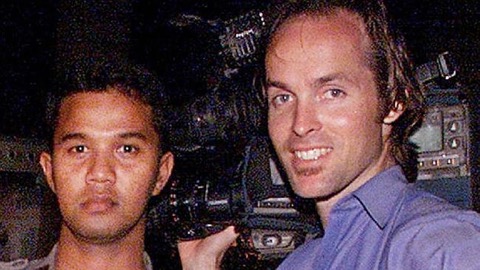Courier-Mail -- Journalism Matters: A high price paid for the truth
Journalism Matters: A high price paid for the truth
- MICHAEL WARE
- THE COURIER-MAIL
- AUGUST 20, 2014 12:00AM

Australian TV cameraman Harry Burton was killed in Afghanistan in 2001.
Once more unto the breach, dear friends, once more …
– William Shakespeare, Henry V, Act III, Scene I.
DID Harry Burton know he was about to be executed? Against giant bare rock, standing in the dirt. When his car was stopped and he was dragged out of it?
Did he know, I’ve long wondered? Asking myself that over and over ever since his murder in 2001.
Even as I found that lonely patch of road and stood there, months later, in silent testament. Grieving. Heaving. On that dusty little highway, by a winding mountain river, on the road to the Afghan capital Kabul. I wondered.
But my heart, that most divining of instruments, tells me – no. When the car carrying him and three other journalists was stopped by retreating Taliban gunmen, they had reason to hope.
As the Taliban’s regime was falling and the United States-led invasion swept south, others had encountered Taliban elements and survived.
Harry and the others might have thought the gunmen wanted only money, or to steal their vehicle, or take their gear. Not to shove them against the cliff-face, without interrogation, without reason and unload their weapons into them. Summarily. Without warning. Killing them all. Leaving their bodies where they fell.
Harry was a brilliant young Australian TV cameraman with the news service Reuters. A tall, wiry strip of a man he lived in Jakarta and roamed South-East Asia telling peoples’ stories. People who had no voice with which to shout to the world of their poverty, or suffering, or injustice. People whom Harry could not ignore. Through his lens he captured their pain or their indignity or even, where he found it, their joy – and showed it to us all in news broadcasts and reports that never bore his name.
On the evening news you’ve almost certainly seen slivers of his work. But it’s the correspondent’s face you would’ve seen, or their name you would’ve heard. Never Harry’s. As a cameraman he served in anonymity. But Harry didn’t mind.
I met him in East Timor. Together we were members of a ragtag band of Aussie journalists in 1999-2000 among the international press corps covering the tiny island country’s bid for independence. And the Australian-led military task force that came to help it – one of our nation’s proudest achievements.
Has it disappeared now from public memory, the making of Timorese democracy, with so much passing since, and it now so far away? Those wild and heady tremors of history? A story told here by great Australian journalists. Such as Fairfax’s Mark Dodd and photographer Andrew Meares. The Courier-Mail’s own snapper Rob McColl. Heather Paterson, writing for the US’ Associated Press. The Australian’s Sian Powell. Or, one of the bravest of us all, John Martinkus, writing often nameless reports for the Australian Associated Press news service.
There are more good journalists left off that list. But these were my friends. Who all shared mightily in the burden of reporting the story for folks back home.
It’s journalism that steps into the breach when other systems fail. Or when wrongs are there to be corrected. Done well, it truly is our fourth estate. Crying foul or calling to account when the rest fail us.
In the West it can plug the holes in democracy. In Queensland we should know that better than others. For decades ours was a broken state. Ruled by graft and corruption. By crooks in police uniforms and politicians bent on their own ends. And there wasn’t a Queenslander who didn’t know it. But could do nothing.
Until a journalist did. In this very paper. News article by news article, Phil Dickie picked at the threads of the corruption. Until the Fitzgerald inquiry was begun. From Dickie came the momentum – that others soon joined and carried onwards – that would bring us to change. And eventually cabinet ministers went to jail and the premier went on trial.
Beyond our lucky shores, in places many of us will never know or visit, journalism can be a war of attrition. Journalists are harassed. Or beaten. Imprisoned. Or killed. In the very countries they call home. For speaking out about things that all of us, somewhere deep inside us, with our own moral compass, know are wrong.
And Australians overseas have a hand in telling these stories. Journalists of whom we should be proud.
Our Peter Greste now imprisoned in Egypt. Or Phil Black dodging paramilitaries in Ukrainian fields. Or those who bore witness for the victims of the 2004 Boxing Day tsunami. Reporting that which must be told. Sometimes with no one else to report it.
Like my friend Harry did. Whom I still miss so very much.
Michael Ware, a former Courier-Mail investigative journalist, was a war correspondent for TIME magazine and for CNN. He is now making a film about his time in Iraq.

Harry Burton told the stories of people who had no voice with which
to shout to the world of their poverty, or suffering, or injustice.
http://www.couriermail.com.au/news/queensland/journalism-matters-a-high-price-paid-for-the-truth/story-fnmd7bxx-1227029728288
